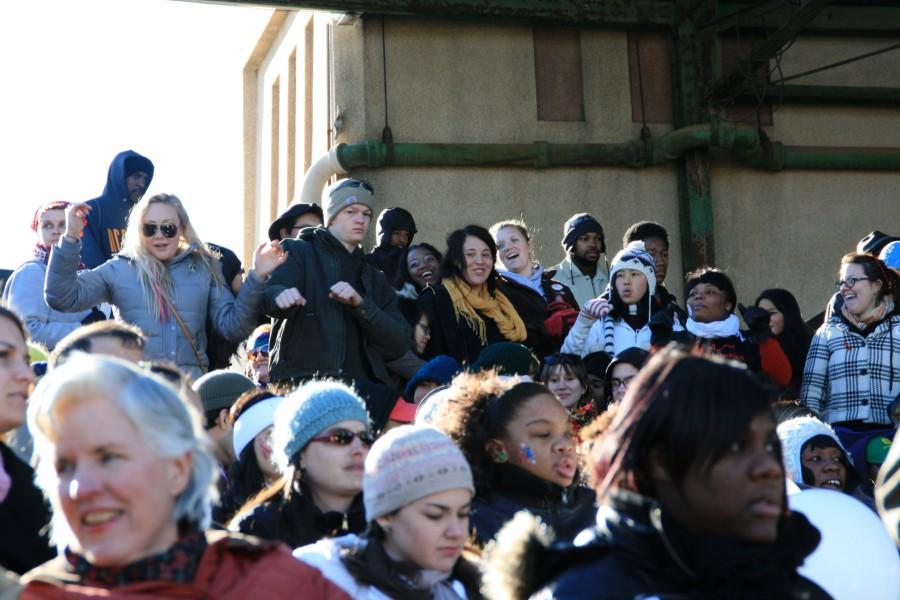We do not talk about the AIDS epidemic. We do not acknowledge the fact that, statistically speaking, several dozen people on Guilford’s campus may be HIV positive, or that AIDS is the leading cause of death for African American women between the ages of 25 and 34.
“AIDS is the elephant in the room,” said Martha Lang ’90, coordinator of LGBTQA services and visiting professor of anthropology and sociology. “Everyone knows it is there but no one wants to say anything about it.”
AIDS, or acquired immune deficiency syndrome, arises from the human immunodeficiency virus (HIV) which causes the human immune system to fail. AIDS Awareness Week, created by the Community AIDS Awareness Program (CAAP), sought to facilitate dialogue on this issue, which too often remains silenced.
The week-long series of events kicked off with the Sex Buffet, held in the cafeteria atrium on Dec. 1. Using the analogy of a buffet, Amanda Pressley ’09 led an hour-long educational dialogue on how to have sex that is both safe and fun. Highlights of the event included senior Andrew Slater demonstrating the proper way to put on a condom while blindfolded and wearing a wooden dildo.
Although there was much laughter and joviality, the underlying message was meaningful.
“The goal is to please and protect yourself and your partner,” said Pressley. “If you aren’t safe, sex has the potential to drastically alter your life in harmful ways.”
Sex education at the college level is important because college students may not understand the risks of unprotected sex.
“Too many people think they know it all,” said junior Gerina Auguste, president of CAAP. “I have been doing this work for years and I still learn something new every time I attend a lecture.”
AIDS is a preventable disease if individuals take the necessary precautions. Too many people do not. As of 2009, there were 33.3 million people in the world living with HIV, according to the World Health Organization. 1.5 million of those people live in North America.
In Martha Lang’s talk on HIV on Dec. 2, she stressed the fact that AIDS is a social issue.
“HIV thrives in climates of social inequality,” Lang said. “If we did not have poverty and social dislocation, we would not have the AIDS epidemic.”
The topic is personal for Lang, who was diagnosed with AIDS in 2001. Since then her health has improved remarkably.
“I am going to die, like everybody,” Lang said. “But I don’t think HIV is going to kill me.”
Lang contracted the virus in 1988, while she was a student at Guilford.
“Being an over-educated white woman means that I get special treatment,” Lang said. “There are people who die horrible deaths from AIDS in this country who do not have to, because they cannot get the medical care they need.”
Junior Ktimine Edgren, an AIDS Fellow, said that most people who are HIV-positive feel they have to hide their status.
“Sex ed is an important component of the conversation,” said Edgren. “But if we’re going to make a sustainable change we need to come together as a community and address the social issues.”
There are many health challenges associated with HIV and AIDS, but what makes it even more painful is the stigma which surrounds it. Guilford is not immune to this harmful attitude.
One of the events coordinated by CAAP was free HIV testing held in Founders. Some students were afraid to be seen getting tested because they thought people on-campus might judge them, according to an anonymous source.
This climate of fear and ignorance is exactly what community members are working to reverse. Senior Cordelia McKusick, coordinator of CAAP, said that the stigma of AIDS results from the fact that the virus “was first seen mainly in African American, gay, poor, sometimes needle-using men.” All of these groups are marginalized in our society, which is how HIV gained such a negative reputation.
On Dec. 5, Guilford students joined the community to show solidarity in the annual Winter AIDS Walk.
“We appreciate the opportunity to be a part of this community, struggling and celebrating life,” said James Shields, director of Community Learning. “We will continue to do this work until AIDS is gone.”

